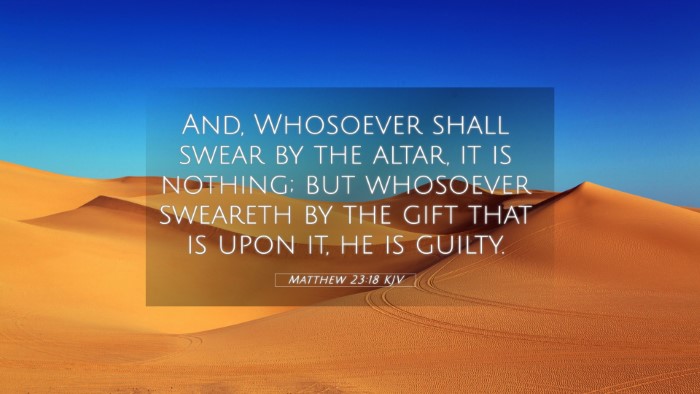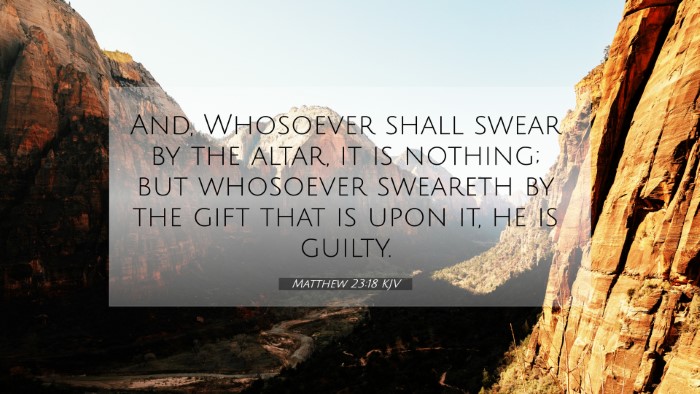Understanding Matthew 23:18
Matthew 23:18 states: "And, You say, Whoever swears by the altar, it is nothing; but whoever swears by the gift that is upon it, he is guilty." This verse is part of a larger discourse where Jesus critiques the religious leaders of His time, exposing their hypocrisy and misguided prioritization of rituals over the true essence of faith.
Context and Meaning
This verse falls within a set of verses where Jesus is condemning the Pharisees for their practices. He highlights their reliance on oaths and the legalistic interpretations they imposed, which often distracted from the weightier matters of the law like justice, mercy, and faith (Matthew 23:23).
Key Insights from Commentaries
-
Matthew Henry's Commentary:
Henry observes that this verse illustrates how the Pharisees twisted God's law to serve their purposes, emphasizing trivial matters while neglecting the spiritual integrity of the commitments they were making. They had reduced the importance of solemn oaths to mere technicalities.
-
Albert Barnes' Notes on the Bible:
Barnes elaborates on the idea that swearing by the altar is seen as less significant than swearing by the gift on it. This hierarchy they created further showcases their flawed understanding of what truly holds value in worship and sacred acts.
-
Adam Clarke's Commentary:
Clarke notes that this passage highlights the absurdity of their practices. By focusing on the outward rituals instead of inward sincerity, they were engaging in a form of deceit that obscured the true purpose of the law.
Cross-References and Thematic Connections
This verse can be cross-referenced with several other scripture passages that resonate with its themes:
- Matthew 5:34-37: Where Jesus teaches about the validity of oaths and the importance of integrity in speech.
- James 5:12: Encourages the people to let their yes be yes, and their no be no, stressing the importance of honesty in commitments.
- Matthew 23:16-17: A discussion of the blind guides who misinterpret the importance of their oaths.
- Luke 11:42: Jesus criticizes the Pharisees for neglecting justice and the love of God while focusing on minute details.
- Isaiah 29:13: Reflects on the people honoring God with their lips while their hearts are far from Him, echoing the warnings given in Matthew 23.
- Proverbs 20:25: Advises caution in making vows, reinforcing the weight of one's words.
- 1 Corinthians 10:31: Urges believers to do everything for the glory of God, contrasting with the empty rituals criticized by Jesus.
Application and Reflection
When seeking to apply the lessons from Matthew 23:18, it is essential for modern believers to reflect on their practices and the sincerity behind them. Are we, like the Pharisees, caught in the ritualistic aspects of faith without the heart behind it? This question invites a deeper introspection into how we express our commitments to God and to one another.
Tools for Bible Cross-Referencing
To further explore themes and connections in scripture, several tools can be utilized:
- Bible Concordance: A reference book or resource that lists words in the Bible along with their contexts.
- Cross-Reference Bible Study: A method that encourages the comparison of related verses to deepen understanding.
- Bible Reference Resources: Includes dictionaries, commentaries, and digital tools to help in identifying relevant scripture connections.
Conclusion
Matthew 23:18 serves as a powerful reminder of the significance of sincerity and the complexities of human traditions in faith. By engaging in comparative Bible verse analysis and exploring thematic connections, believers can develop a more holistic understanding of scripture and its application to their lives.


